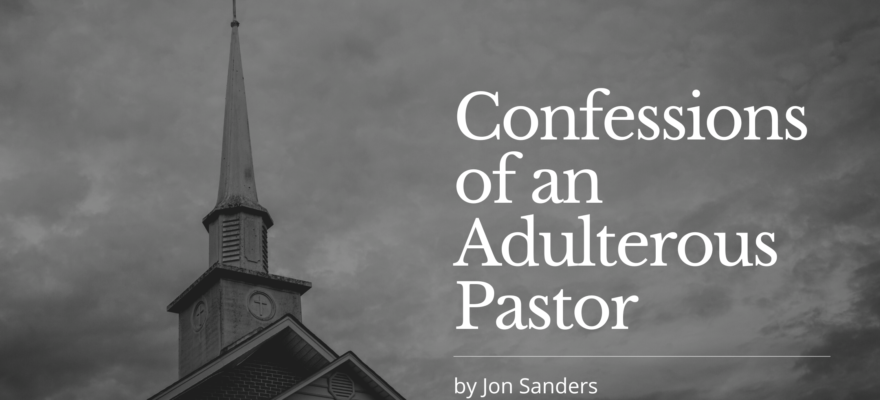I’ll never forget the pit in my stomach as I hung up the phone and tried to begin processing the horrible news I had just received. Another pastor had fallen into sexual immorality and left behind the wreckage of devastated hearts in the wake of his secret sin now exposed. But this wasn’t just another random pastor. This was someone very close to me in my life and ministry. I was about to have a front row seat to watch this man’s life spiral ever downward into the depths of destruction.
In the days, weeks, and months to follow, many attempts were made by myself and other godly leaders in ministry to throw a lifeline of grace, accountability, transparency, and repentance out for this brother to grab hold of. But none of our attempts succeeded. In the end, he remained steadfast in his willful rebellion against God and ended up walking away from his wife of 40 years, his family, his church, and all that he had worked so hard to build over his lifetime.
As I tried to get my mind wrapped around this sad and dysfunctional situation, I found myself asking some tough questions. “How did this happen?” “How did he get here?” “How do you get to the point that you’re willing to walk away from everything you’ve known for the seductive lie that promises greener grass beyond sacred borders?”
As I evaluate what I know to be true from this man’s life, I’m convinced that if he were to be honest he would make the following confessions:
1. “I was not in Christian community.”
While this man led God’s people spiritually for years, he never saw the importance in connecting closely with any of them. He believed the lie that says pastors are better off not having close friends in the church. He was lonely and isolated. Isolation is dangerous and Satan loves nothing more than to prey upon those who are removed from the protective safety that can be found in Christian community.
2. “I resisted accountability in my life.”
This pastor thrived by being in control. Therefore, he didn’t see the need to be accountable for how he spent his time, how he handled his money, whom he counseled, or whether or not he was under any kind of authority in his life. People answered to him…never the other way around.
3. “I did not walk in authenticity and transparency.”
It was hard for people to really know this pastor. He did a great job of keeping a plastic façade up on the outside to conceal the real emotions and pain he was dealing with on the inside. Even when things were extremely difficult in ministry, he would just put on his brave face and muscle through situations rather than admit that he was hurting.
4. “I did not pursue emotional health.”
While this pastor may have had a great degree of biblical training and education (which some might have interpreted as spiritual maturity) he was not operating from a place of emotional health. He refused to deal with deep emotional wounds that were buried deep in his past.
5. “I failed to set healthy boundaries in my life.”
The sin of people pleasing and seeking validation from other co-dependent people kept this pastor from setting and keeping healthy boundaries in his life. This lack of boundaries made it possible for unhealthy relationships to form and grow.
6. “I broke my own rules and put myself in situations I should not have.”
At one time in his ministry, this man heeded the counsel of other godly, wise men who admonished him not to be alone with a woman behind closed doors, not to counsel a woman alone, not to go on lunch outings alone with another woman, or to be alone in a car together with a woman that wasn’t his wife. But somewhere along the way he got sloppy and began to violate these principles.
7. “I was not willing to seek counseling.”
While this pastor had logged countless hours counseling others, he did not see the need to seek counseling himself as his life grew more and more dysfunctional.
8. “I didn’t deal with pride in my life.”
Whether it was the easily recognizable form of pride that looks like an over-inflated ego, or the more subtle form of pride that takes on the pity-party-throwing self-focus of a victim mentality, this man’s life was full of both.
9. “I became bitter.”
Like every other pastor, this man had been hurt in ministry. But instead of properly processing that pain and leveraging it for growth, he became cynical and bitter. In time that cynicism was even directed toward God which resulted in spiritual callousness and passivity.
10. “I surrounded myself with weak people.”
Rather than surrounding himself with strong leaders who would have challenged and even disagreed with him at times, this man chose instead to be surrounded mostly by “yes men”, people who lacked the back bone to engage him in conflict.
11. “I withdrew from my family.”
As this pastor descended deeper into his deceitful lifestyle, he became more distant and withdrawn from his wife and children.
12. “I lied when confronted.”
As his trail of secret sin became known to others and he was questioned about it, instead of choosing to walk in humble repentance, he chose more lies and deception.
13. “I caused pain in many people’s lives.”
The sad reality is that our sin harms far more people than just ourselves. In this man’s case, the shockwaves of his betrayal and deception were felt far beyond his immediate family. For decades he had stood in the pulpit declaring God’s Word to hundreds, probably even thousands of people. As word of his adultery spread out into the Christian community, many people were left devastated and confused.
I want to challenge anyone reading this to learn from this man’s mistakes and heed the warning signs if they begin to surface in your life. I promise there is no short-term pleasure in this world that is worth throwing away your marriage, severing your relationships with your children, causing such deep pain in the hearts of God’s people, and bringing disgrace to the name of Jesus Christ. If you can identify one or more of the above confessions as descriptive of where you’re at in your life right now, I implore you to get help…and do it today!
About the Author: Jon Sanders is the co-host of the EntrePastors Podcast that serves pastors by helping them think, act, and thrive as prosperous entrepreneurs. As a leading voice in the rural church arena, Jon hosts the Small Town Big Church Podcast that seeks to encourage rural pastors with the message that God delights in doing BIG things in small places. Jon also serves as the Director of Coaching for the 95Network, an organization that specializes in serving small to midsize churches.


